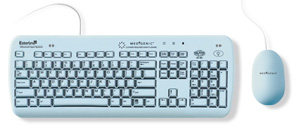A new keyboard that reminds its user that it needs to be cleaned regularly has been developed by scientists at the University College London Hospitals NHS Foundation Trust (UCLH), with backing from NHS Connecting for Health.
The Advanced Input Systems Medigenic keyboard, which is claimed could cut cases of the MRSA superbug by up to 10%, was produced by UCLH consultant microbiologist Dr Peter Wilson and clinical scientist Dr Paul Ostro, with the support of NHS CfH.
Microbiologists at the trust created a keyboard equipped with a timing device, which warns nursing staff when they need cleaning, and hidden sensors which ensure that the surfaces are cleaned properly with alcohol wipes.
The scientists wanted to create a new way of ensuring that infection risks did not rise, as more computers are used in the NHS.
Dr Ostro said: “MRSA on keyboards is a big problem because you can’t easily clean conventional computer keyboards – you cannot get between the keys. You cannot put water on them or fluids and therefore cannot clean the surfaces easily.”
UCLH’s own studies have shown that 20% of keyboards may carry MRSA. Commonly used plastic keyboard covers that are rarely cleaned could also collect bacteria. This increases the risk of passing on the superbug, which kills around 5000 people a year in the UK.
Dr Wilson said: “As we are going to be increasingly using computers we thought we would have to come up with a model that was very easy to clean to try to break the cycle of infection.”
The doctors took their concept to US medical equipment providers, Esterline, who were interested in the product and developed the warning light alert system that activates every three or 12 hours and does not stop flashing until the sensors detect alcohol wipes cleaning the device.
A spokesperson from Esterline told E-Health Insider: “The Medigenic keyboard uniquely helps monitor its own cleaning status to safeguard both patient and staff. Conventional keyboard tactile feedback allows for high speed data entry while the flat design enables quick cleaning with hospital-grade disinfectants.”

The keyboard (computer model above) is accompanied by an optical, sealed mouse designed with a flat under-surface, instead of the usual rolling ball, which can collect bacteria.
Dr Wilson said: “Testing of the Esterline Advanced Input Systems Medigenic keyboard in the medical surgical ICU at UCLH showed significant log reduction in bacterial contamination in the range of 0.5 log – 1.4 log (71% – 96%) at cleaning alert settings ranging from 1.5 to 12 hours.
“The cleaning alert afforded a significant advantage in the Medigenic design in promoting a high level of cleaning compliance and a reduction in bacterial contamination during use in the ICU.”
He added that if anything, a flashing light would encourage users to clean their keyboards more often.
“The warning light is slightly irritating so people are more likely to take an alcohol wipe and clean the surface to switch it off – and of course they disinfect their own hands while doing it.”
Duncan Barton, the modern matron in charge of infection control at UCLH told E-Health Insider: “The new keyboards will help nursing staff who are responsible for cleaning the equipment be able to tackle potential MRSA dangers a lot easier and faster. The design of a flat surface will aid this making it quick and easy to wipe down with alcohol wipes.
“As we move towards a time when nurses need to move from patient to computer constantly, this will help limit the chances of spreading MRSA by up to 10 per cent and will help us to continue to meet the Department of Health MRSA targets of reducing MSRA rates by half by 2008.”
The UCLH hospital management board were impressed with the testing results and have now approved the purchase of 2000 of the keyboards, which will be delivered early next year. The keyboards have a lifespan of up to four years.
Dr Wilson said: “This is a significant step forward in the battle against infections like MRSA. You can run education campaigns to get people to wash their hands more often but the impact only lasts for about eight weeks. But with these keyboards you have got a constant reminder of the importance of washing your hands and keeping your computer clean.”
The MRSA-proof keyboards are not the first on the market in the UK, although they are the first to be developed by an NHS trust. One such keyboard, the SlimKey-MD made of silicone rubber and polycarbonate, is manufactured by IKEY, a company based in Austin, Texas.
A study at the university of Chicago on computer keyboards and bugs other than MRSA showed that just touching a keyboard, even with gloves, risked passing on antibiotic-resistant bacteria, and that soap and water did not necessarily remove infection.
Related stories
Easy-clean keyboard reduces MRSA risk
Computer equipment could help MRSA spread
